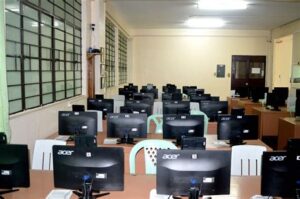Back to: Computer Studies JSS1
Welcome to class!
In today’s class, we shall be talking about the meaning of computer room. Please enjoy the class!
Computer Ethics – Meaning of Computer Room

In the realm of computer science, ethics plays a crucial role in guiding the responsible and morally sound utilization of technology. Computer ethics encompasses a set of principles that govern the behavior of individuals and organizations in the digital sphere, ensuring that technology is employed in a way that respects human values and promotes positive outcomes for society.
Defining the Computer Room

The term “computer room” refers to a designated space specifically designed to house and operate computer systems. These rooms typically feature controlled environmental conditions, such as regulated temperature and humidity, to safeguard sensitive electronic equipment. Additionally, computer rooms may implement security measures to protect against unauthorized access, data breaches, and physical damage.
Computer Ethics in the Computer Room
The principles of computer ethics extend to the management and utilization of computer rooms. Here are some key considerations:
- Access Control and Security:
- Implement robust access control mechanisms to restrict entry to unauthorized personnel.
- Employ secure passwords and encryption techniques to safeguard sensitive data.
- Educate users about cybersecurity best practices to prevent malware infections and data breaches.
- Responsible Resource Management:
- Promote efficient energy consumption practices to reduce environmental impact.
- Encourage sustainable disposal of electronic waste to minimize environmental harm.
- Optimize resource allocation to ensure fair access to computing resources.
- Privacy and Data Protection:
- Adhere to data privacy regulations and respect user consent when collecting and using personal information.
- Implement data security measures to protect against unauthorized access, modification, or disclosure of personal data.
- Educate users about online privacy risks and empower them to control their data.
4. Ethical Considerations for Software Development:
- Develop software that is free from harmful biases and promotes inclusivity.
- Design software that respects user privacy and provides clear and transparent data usage policies.
- Ensure software accessibility for individuals with disabilities.
- Professional Conduct and Accountability:
- Uphold high standards of professionalism and ethical conduct among computer users and administrators.
- Establish clear policies and procedures to address ethical dilemmas and breaches of conduct.
- Promote a culture of accountability and transparency in the use of computer resources.
By incorporating these ethical principles into the management and utilization of computer rooms, we can foster a responsible and ethical approach to technology, ensuring that it serves as a force for good in society.
We have come to the end of today’s class. I hope you enjoyed the class!
In the next class, we shall be discussing Components of a computer room.
In case you require further assistance or have any questions, feel free to ask in the comment section below, and trust us to respond as soon as possible. Cheers!
Question Time:
- What is the significance of computer ethics in the context of computer rooms?
- How do computer ethics principles influence the design, management, and operation of computer rooms?
- Discuss the ethical implications of data security and privacy in computer rooms.
